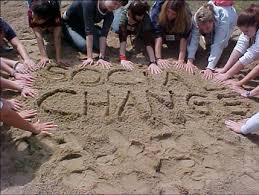 Happy Women’s History Month from Science Grrl! But for this post, you can call me Engineering Grrl, even though the only thing I’ve ever engineered is how to make all the pieces of an IKEA furniture piece fit where they need to fit.
Happy Women’s History Month from Science Grrl! But for this post, you can call me Engineering Grrl, even though the only thing I’ve ever engineered is how to make all the pieces of an IKEA furniture piece fit where they need to fit.
Why am I Engineering Grrl this month? Because I’m participating in the fifth annual Global Marathon For, By and About Women in Engineering! It’s a live webcast and teleconference that ran continuously from noon on Wednesday, March 11 through Noon Thursday, March 12, 2009.
Archives from the 2008 Marathon feature presentations originating from points worldwide, with North America leading off, followed by South America, China, India, South Africa, and Europe. Topics included tips on heightening awareness of science, technology, engineering, and mathematics issues among pre-college, college, and young career women, and examining issues such as retaining women in college engineering programs and the workplace.
The schedule demonstrates how engineering for and about women can be discussed around the world in 24 hours. Doesn’t that just blow your mind? I was excited about what would be discussed from the perspective of Africa. I’ve known plenty of women engineering students who hoped to take their engineering skills to Africa to work toward alleviating suffering from drought by crafting new irrigation systems or bioengineering drought-proof seeds.
I’ve found that many women engineering students think this way– They wonder how they can help the world with their engineering skills. Yes, they “ooh and ah†at rockets but most of the women I’ve met who study engineering are thinking with both their brains and hearts. Of course, it’s not just women: Engineers without Borders, which involves both male and female engineers, is one of the fastest growing student groups on college campuses. National Engineers Week Foundation makes a point to have a “humanitarian†group listing.
When people ask me how I try to convince girls to take an interest in engineering, I reply that I don’t. I ask them what their interests already are and then point out the science, technology, engineering and math could encompass those interests. Does she want to have her own cosmetic line? Well I point out that she should have a solid chemistry background (you don’t want her to turn out like Frenchie from Grease!) and perhaps even a bioengineering background to help smooth out wrinkles, keep mascara from running and make bronzers natural, but also glittery.
There’s not much in this world that hasn’t been handled by an engineer. We just need to see it and help our girls see it too.

 Intergenerational convo–my fave subject, as you know!–currently going on over at RH Reality Check:
Intergenerational convo–my fave subject, as you know!–currently going on over at RH Reality Check: There’s a reason I’ve been a little quiet around here this week (and have been sitting on a few posts by others that are ready to go): My beloved 13-year-old cat, Amelia Bedelia, saluted by Marco and
There’s a reason I’ve been a little quiet around here this week (and have been sitting on a few posts by others that are ready to go): My beloved 13-year-old cat, Amelia Bedelia, saluted by Marco and  My latest post at
My latest post at  This just in from my friends over at the
This just in from my friends over at the  According to Kimberly Palmer in this week’s
According to Kimberly Palmer in this week’s  Man, Twitter has taking some serious hits in the media this week. First
Man, Twitter has taking some serious hits in the media this week. First  …what of the youth shaped by what some are already calling the Great Recession? Will a publication looking back from 2030 damn them with such faint praise? Will they marry younger, be satisfied with stable but less exciting jobs? Will their children mock them for reusing tea bags and counting pennies as if this paycheck were the last? At the very least, they will reckon with tremendous instability, just as their Depression forebears did.
…what of the youth shaped by what some are already calling the Great Recession? Will a publication looking back from 2030 damn them with such faint praise? Will they marry younger, be satisfied with stable but less exciting jobs? Will their children mock them for reusing tea bags and counting pennies as if this paycheck were the last? At the very least, they will reckon with tremendous instability, just as their Depression forebears did. I’m THRILLED to announce that my nationally touring (whohoo!) intergenerational panel, “Women, Girls, and Ladies” will be
I’m THRILLED to announce that my nationally touring (whohoo!) intergenerational panel, “Women, Girls, and Ladies” will be 